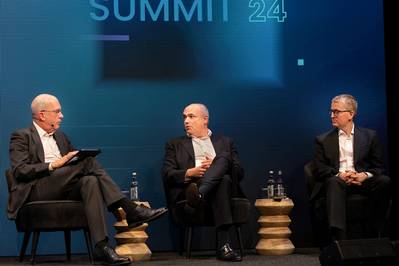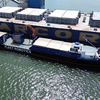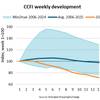Hapag-Lloyd, Maersk Cooperation Targets 90% Service Reliability
The two people leading Hapag-Lloyd and Maersk into the new Gemini Cooperation spoke at the Xeneta Summit in Amsterdam last week expressing confidence in the new alliance achieving its ambition of 90% service reliability.
The Gemini Cooperation will begin operating on February 1 next year, with a new hub and spoke approach of mainliner and transshipment services designed to increase reliability.
Rolf Habben Jansen, CEO of Hapag-Lloyd, and Kenni Skotte, Vice President and Head of Ocean Network Product at Maersk, explained how Gemini can achieve its ambition of 90% service reliability when global reliability across all ocean container shipping carriers in the market stands at 53%.
Skotte said: “We are confident of the 90% number because we believe we can do it. But I recognize when people look at schedule reliability in the market today it’s hard to imagine. If we sit here again next year, we will have a very different discussion because by then we will have been able to prove that it works.”
Gemini Cooperation will cover seven trades and offer 57 services including mainliner and dedicated shuttle services. Habben Jansen and Skotte both said that increasing use of transshipment networks will allow for more stable and reliable services for shippers.
Habben Jansen said: “Transshipment services are increasing from 35% to 45% but we are going to do it in a much more structured and planned manner at hubs we control ourselves.
“Hubs have more capacity than is strictly required and that is very much a choice. We don’t operate hubs to make money, we operate hubs to make the network work. More cranes, more space than one would normally do with multiple terminals we can access.
“What gives us confidence is the way the whole system has been designed, because it’s very much about being able to isolate delays. Whereas today what we tend to see is a delay of one or two delays snowballs into significant delays and that has a ripple effect.”
The Gemini Cooperation recently confirmed its ships will sail around the Cape of Good Hope in Africa when it begins operating in February due to ongoing conflict in the Red Sea. Both Skotte and Habben Jansen confirmed this will not impact Gemini’s target of 90% reliability.
Habben Jansen said: “In today’s challenging environment, our network can cover both scenarios – whether through the Red Sea passage or around the Cape of Good Hope – ensuring we maintain the same industry-leading reliability.
“The Gemini Cooperation is designed in response to the evolving needs of our customers in an increasingly dynamic and volatile industry.
“In this context, our hub-and-spoke model allows us to operate a lean network by leveraging central hubs, all while preserving the global coverage our customers have come to rely on.”
Skotte added: “We believe our new innovative ocean network will significantly improve schedule reliability to the benefit of our customers and set a new and very high standard in the industry.”













